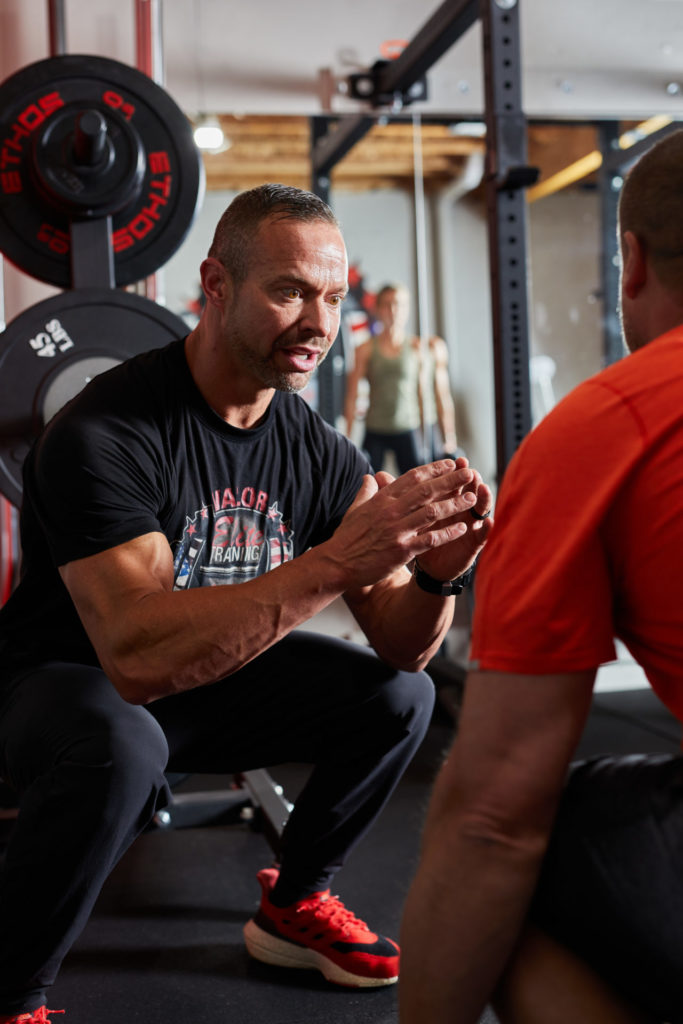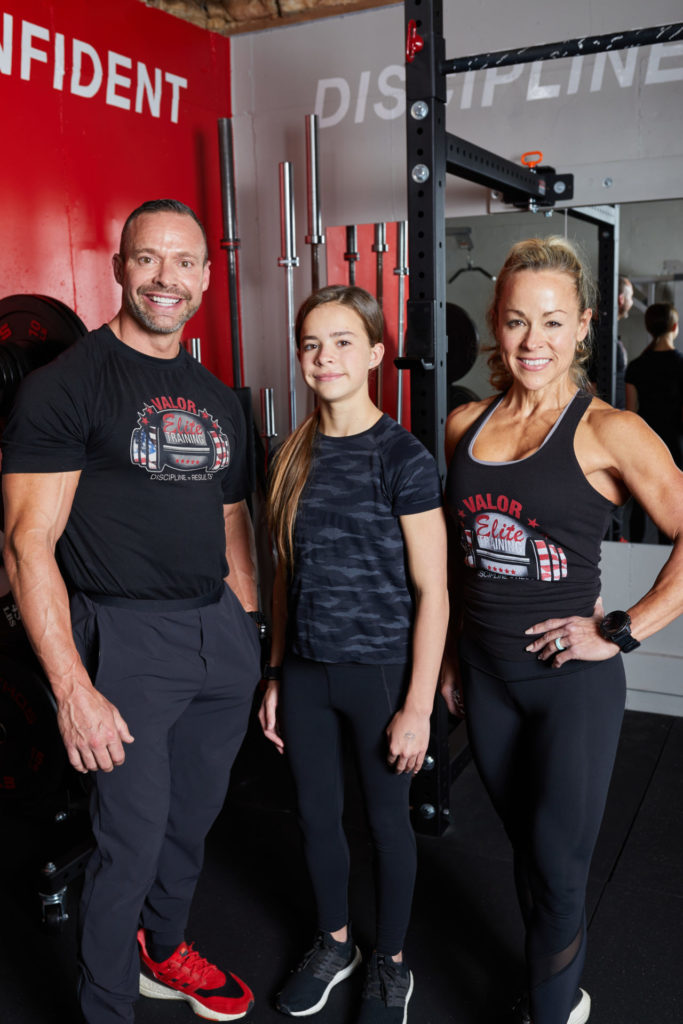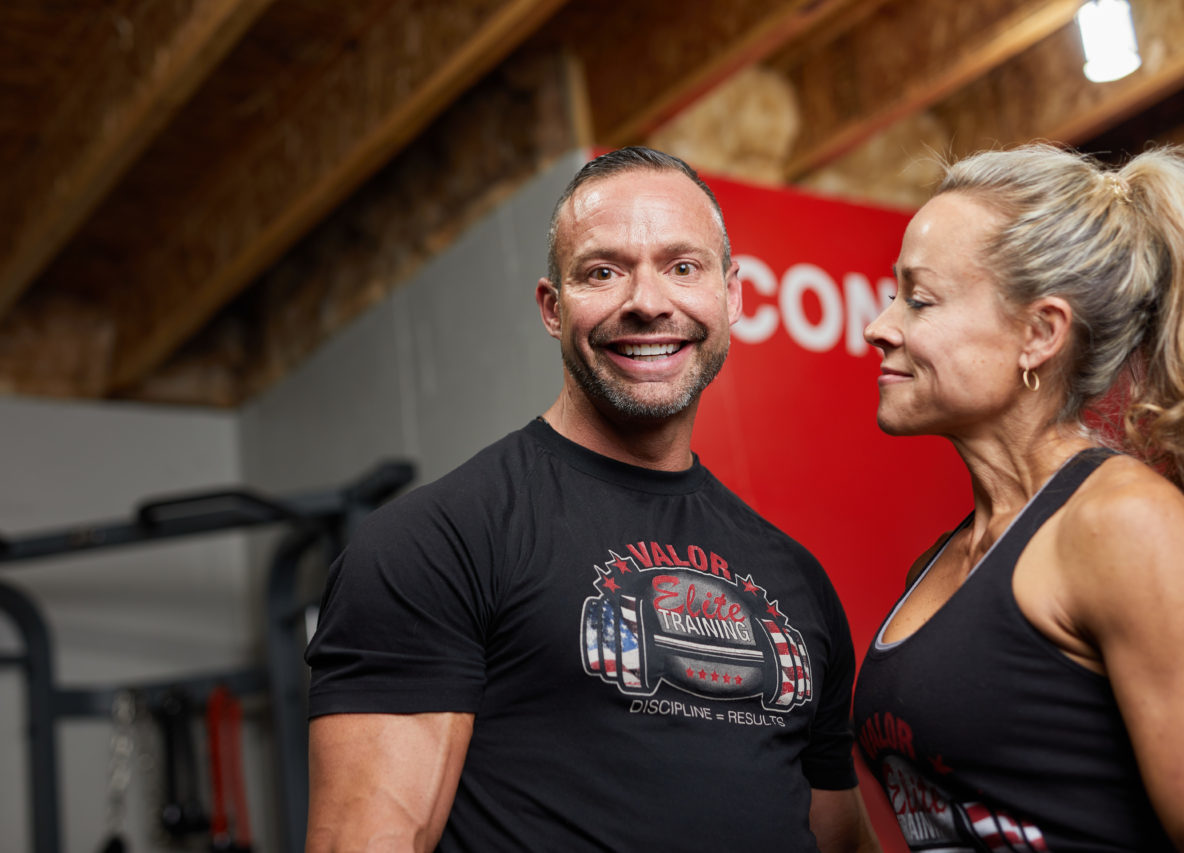It’s possible that Tim and Kristen Anderson will have a bit more sympathy for their clients.
The two are married and run their own training business. It’s their job, literally, to hurt their clients (in a good way). But at the end of March, their clients got even.
The Andersons put on a Make Your Trainer Sweat fundraiser, and the concept is pretty simple: In exchange for donations, the Andersons do exercises. His clients had six to choose from. They were doozies.
“I picked burpees, box jumps, lunges, pull-ups,” Tim, 45, says. “All of the awful ones.”

Tim works with a client at Valor Elite. Photo by John Robson.
His Make Your Trainer Sweat fundraiser brought in more than $35,000 this year, which will be donated to Children’s Hospital. Though it might not have been pretty, Tim and several other trainers in Northern Colorado felt the burn as they sweat for the dollars their clients pledged.
Tim became a trainer after joining Miramont, the longtime fitness institution in Fort Collins now owned by Genesis, in 1999. It’s a fairly typical story: He liked sports, wrestled and played football through high school. His college business major, corporate wellness, fit well, as he had to take a lot of physical education classes. He always liked being around people and needed a place to spend his vast reservoir of energy. It seemed like a good fit.
He loved the job. He greeted clients with a huge smile and a “Hey, Buddy!”, all the better to make it hurt a bit less. He also loved seeing the results of that discomfort.
“You’d see people lose 70 pounds,” Tim says. “You’d see people with knee injuries who couldn’t get out of a chair have an active life again. One guy wasn’t all that fit, and now he’s a Navy S.E.A.L. It was truly life-changing for them.”
He worked at the gym for decades, and his eventual wife did as well, and the two would occasionally talk about opening their own business. It’s tough to be a trainer: The two rise at 3 a.m. every morning to do their own workout before meeting their first client at 5 a.m. and finishing at 6 p.m. But the gym offered security—they had four children—and security was hard to leave, until the pandemic made that security disappear.
They don’t know, even today with a roster full of clients, if they would have gone out on their own, but COVID-19 didn’t leave them much choice. The gyms, like most public businesses, shut down, and they didn’t know if they would have a job again in two weeks or two years. They began hosting their clients at their home. The clients loved the extra personal attention as a result. And they needed income.

Tim, Sophia and Kristen Anderson. Photo by John Robson.
They bought equipment, cleaned out a lot of junk (“that was a blessing,” says Kristen, 55) and opened up Valor Elite. Kristen did a lot of the paperwork at first and left Genesis to join her husband a few months later. It was a lot of money up front, but they also got to keep all the money their clients paid them, instead of the gym taking half.
The business went so well that the Andersons felt grateful and wanted to give back. They established a fundraiser for the Larimer County Food Bank in the fall, and knew they had a spring fundraiser after hearing about the StellaStrong Foundation, which honors a Douglas, Wyo., girl, Stella Beard, who died in 2017 at age 3 of a rare pediatric brain cancer called DIPG. Tim and Kristen have Stella’s parents as clients.
Tim came up with the Make Your Trainer Sweat format last year and did crazy amounts of painful exercises, such as 400 pull-ups and 120 burpees in three hours. He raised more than $12,000 for DIPG research at Children’s Hospital.
“It was horrible in a good way,” he says and laughs. “I was a train wreck.”
The $12,000 encouraged him, even if it hurt him, and so this year he got Kristen to join in, along with 20 other fitness trainers. Many of them were friends who had to open their own businesses as well. He’s excited about it: If he raised $12,000 last year, just how much can he raise this time?
Tim lost his aunt when she was 37 to leukemia, and that also inspired him to raise money for DIPG research. DIPG can be a discouraging disease to fight: It nearly always kills really young children, and nearly all diagnoses are fatal. But Children’s Hospital doctors told Tim that leukemia once had the same death sentence, and now the cure rate is nearly 90 percent.
Maybe, with research, they can find a way to beat DIPG as well.
Regardless, the research gives parents hope. Hope is important to Tim: His own clients gave him hope to pursue a dream during the pandemic, a period in most people’s lives that seemed pretty hopeless.
___________________________________
Dan England is a freelance writer based in Greeley.

